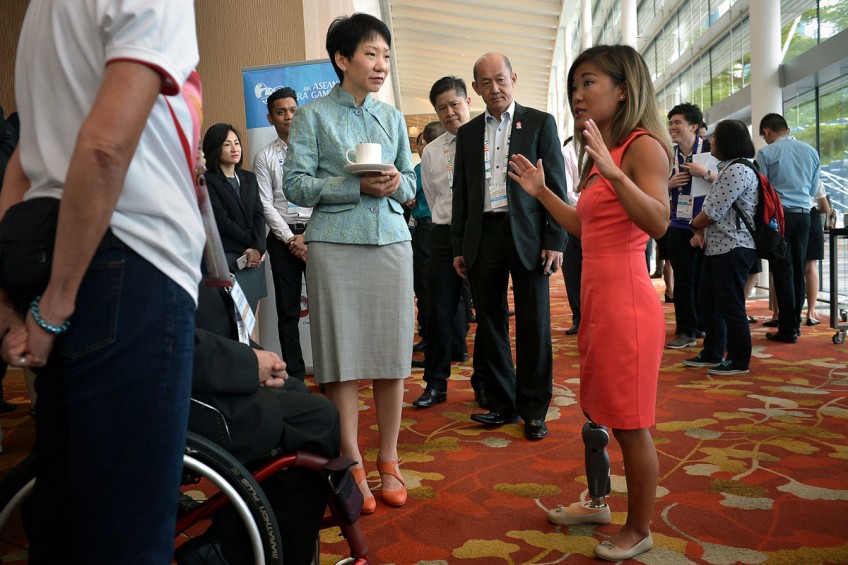Bassett rallies for para-athletes


They have topped the medal table in eight out of 14 Paralympic Games and have amassed 697 gold medals, more than any other country in the history of the event.
Yet, women's para-athletics 400m world record-holder Scout Bassett revealed that many Americans still confuse the Paralympics with the Special Olympics.
Bassett, who is aiming to qualify for Rio 2016 in the T42 class for the 100m and long jump events, says that the United States still has much to learn about para sports, just like Singapore.
The 26-year-old, speaking to The New Paper after the ASEAN Para Games symposium at Marina Bay Sands yesterday, said: "The really exciting thing for para-athletes is that for the first time since the London Games in 2012, we are getting incredible exposure in the US in terms of sponsorship, and that's really a first.
"I'm sponsored by Nike and Citibank. There are also several other elite para-athletes who are getting huge amounts of sponsorships and opportunities.
"These athletes are going to be part of mega campaigns, especially leading up to Rio 2016. We are going to see a lot of para-athletes in the mainstream media that we didn't see before. I think it's on the rise.
"We have so much more to do though, especially in the development of these para-athletes.
"In the US, a lot of how a para-athlete becomes a Paralympian is on his own. You cannot make a living just by the US Paralympics funding. "I started with years of no funding, I worked two jobs before I was sponsored last year.
"The challenge is developing para-athletes at an earlier stage, to fund them so they can target the Paralympics.
"In several countries, athletes make quite a good living by being sponsored by their national governing bodies (NGBs).
"That's not the case in the US and I don't think that will be any time soon because, unlike a lot of NGBs, the US Paralympics is a non-profit organisation funded purely by sponsors and donors without government funding."
The fact that the Paralympics will be broadcast on America's public television network NBC for the first time next year suggests the Games, and their elite athletes, are set for newfound recognition very soon.
Bassett, who converted from triathlon to track and field in 2011, feels that education is the only way to get more people involved, investing and believing in para sports, both at the social and elite level.
"Had I never gotten a running prosthetic, I don't know that I ever would have pursued running or even pursue this road to the Paralympics," said the 1.42m tall Bassett, whose fairy-tale rise from an orphanage in China mopping floors and washing dishes to Paralympic hopeful has inspired many around the world.
"There's so many disabled people who don't know until you give them that equipment... Education is such an important part.
"There's nothing wrong if you just want to be active and just get out and run, but it's a different ball game if you want to compete in the Paralympics. That doesn't happen without the education about how to use the equipment."
BREAKTHROUGH
Bassett advocates having disabled athletes training with their able-bodied counterparts, and believes the Singapore Sports Institute (SSI) is working towards such programmes here to achieve a breakthrough in para sports.
Whatever ASEAN lacks at the elite level - the region has combined for 20 Paralympic gold and 89 medals in total - Bassett feels that the Republic can lead the fight by generating a positive buzz with the Para Games.
"I see signages, banners and promotional items in prominent places and I believe they were put up a month before," said Bassett, who will be conducting a clinic at the SSI tomorrow.
"I can feel all the energy, excitement and enthusiasm, and it shows Singapore must be doing something right.
"The passion of the volunteers is unreal and there is such great momentum. It is unlike anything we have done in the US, where nobody knows what is going on even for a big event like the Paralympic trials.
"You may not be at the level as some other big countries like Japan and China are, but keep this up and I'm sure Singapore and the region will be making huge leaps."

This article was first published on December 3, 2015.
Get The New Paper for more stories.